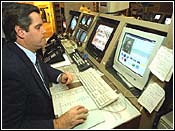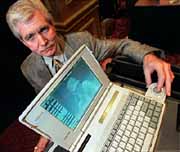Big Brother is
watching you and has your face in the database!
 |
A system, using a science known as biometrics, was created at
the Massachusetts Institute of Technology to use computers for human
identification. It focuses on the eyes and and prominent facial points in order
to build up a digital identity which can then be compared against other faces
from a database.
That seems fine, but what if players in a casino were
scanned using the MIT system, what if it were you? Once your face is in the
computer it can be transmitted to other databases around the world, to anyone
in fact that pays for the service. That is illegal in the U.K. but it doesn't
stop people doing it.
The revelation after the fact that Tampa police
used facial recognition software on people at the January 2001 SuperBowl
triggered a furor among civil liberties experts, who called it intrusive. Law
enforcement officials defended the use of the technology by saying it's similar
to what American consumers are subjected to in banks, stores, apartment
buildings and some public places.
Three of Atlantic City's 12 casinos
— Trump Marina, Trump Taj Mahal and Trump Plaza — use it as part of
their casino surveillance units. "It's a tool for us to identify people who
could possibly come in and take advantage of our casino," said Trump Marina
surveillance director Charles Guenther.
The technology's popularity
could likely spread as the result of media coverage about its use on fans
entering Raymond James Stadium in Tampa, Fla., for the SuperBowl.
Quick
and efficient, facial recognition software brings casino surveillance into the
21st century, according to James Pepin, vice president of sales for Biometrica
Systems Inc., of Mont Vernon, N.H., which leases the system to casinos for $675
a month.
 Another face watcher is
Dave Rapp. When he gets a call he heads to his pickup truck and flips open his
laptop. With a few clicks, he sees a live shot of a player in a place as far
away as Mississippi or just around the corner in Las Vegas, all from the
comfort of his drivers seat. If the player was a card counter, it's a safe bet
Rapp would know the face. He has 5,000 memorized. Another face watcher is
Dave Rapp. When he gets a call he heads to his pickup truck and flips open his
laptop. With a few clicks, he sees a live shot of a player in a place as far
away as Mississippi or just around the corner in Las Vegas, all from the
comfort of his drivers seat. If the player was a card counter, it's a safe bet
Rapp would know the face. He has 5,000 memorized.
For years Dave Rapp's
method was part of the old way of catching "advantage players", professionals
to you and me. Once a player was spotted in a casino, staff would look through
pages of mug shots, hoping to see a match. Now he and everybody else are forced
into going high tech, using the new computer programs that recognize faces,
databases of suspects and networks that link nearly every casino in the
country. A person playing blackjack in Las Vegas could be caught by virtue of
his record at a casino in London -- in real time.
 |
Here is Andy Anderson. He used to patrol the casinos, keeping
an eye out for suspicious activity. Many pros began to recognize him and now he
rarely enters. Instead, he lets technology do the work. He has put players mug
shots into a computer program and markets the database to the casinos.
His service is for hire through his company, Casino Visual
Identification. To look up a card counter in Anderson's program, a casino
official clicks the mouse on the icon for the game the player is playing.
Blackjack has a picture of a blackjack hand, craps is a picture of dice,
roulette is a roulette wheel. Each game has a list of known cheats or card
counters.
Each name has a picture or several to go with it, aliases the
player uses and a list of associates. Plus, a casino can communicate directly
with another casino, sending a live picture via a system similar to e-mail and
asking: "You seen this guy?" Anderson's services can run up to $16,000.
Anderson used to work for the other main culprit of professional player
identification, Griffin Investigations owned by Bob Griffin and his wife
Beverly. Rapp also worked for the company.
Some London casinos have been
tempted by the experts knowledge of professional gambling and have signed up to
the Anderson program, transmitting live footage of players from their casino to
the L.A. headquarters for I.D.. Investigation is currently underway to
determine the legality.
Some good news is filtering through though.
The general public and professional players alike will no doubt be heartened by
the ruling in Canada that face recognition systems cannot be used
in secret. Ontario's privacy commissioner says casinos must tell patrons they
could be subject to face scanning. The Alcohol and Gaming Commission of
Ontario, which oversees the eight casinos where the scans are done, said it
will comply with the commissioner's ruling on public notification |